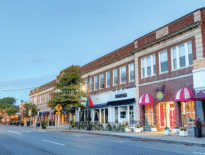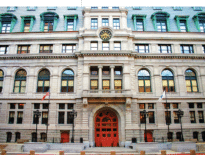Speaking to the Greater Boston Chamber of Commerce Thursday morning House Speaker Ron Mariano indicated he wants to use Gov. Maura Healey’s $4.1 billion bonding bill to connect Weymouth and Brockton up to the MWRA water and sewer network.
If that doesn’t sound like headline news, perhaps a direct quote from his remarks will change your mind.
“[W]e have people who want to build 6,000 homes in Weymouth and they just need a water source. And if we can use this bonding bill to get that done, you’ll see some impact on the South Shore,” he said, per State House News Service.
Along with the old Fort Devens, the Weymouth redevelopment is one of the white whales of Greater Boston housing policy. Both storied military bases were shuttered after the First Cold War in the 1990s, but big development dreams there crashed hard against the realities of NIMBYism and unwieldy governance structures that required the Town Meetings of multiple exurbs to agree on even the most basic of things.
You can guess how well that went when the original development vision, heavy on office and industrial uses, stopped lining up with market realities pre-pandemic.
Add in fallout from a global financial crisis, a rickety water and sewer situation and either incompetence or malfeasance by a prior South Weymouth master developer, and you get new construction that amounts to a mere drop in the housing supply bucket – at a site that already has its own commuter rail station.
Nowadays, New England Development and Brookfield Properties are in charge and last winter they got Weymouth, Rockland and Abington to pass a new zoning package that allows for those 6,000-some new homes.
If Mariano can finally push the MWRA connection through 16 years after the base was targeted for redevelopment, it will likely turn on the taps on for more housing.
That’s why it was frustrating to see Mariano, at the same Greater Boston Chamber event, come out in favor of an opt-in municipal real estate transfer tax to put more affordable housing money into local officials’ hands.
The 6,000 homes planned for South Weymouth are far more real than any of the affordable units municipal officials say they’ll fund with transfer tax money. In many cases, those dollars will disappear directly into consultants’ pockets.
With very few exceptions – Cambridge’s updated Affordable Housing Overlay is a notable example – affordable developers will still need to wade through years of public hearings and NIMBY-driven design reviews before ever sticking a shovel in the ground.
That endless and uncertain permitting process can raise a building’s cost by double-digit percentages. Instead of tackling that big cost driver at a time when key parts of the development process are prohibitively expensive, Mariano seems content to saddle every housing developer with more expenses in the form of an extra premium on the land they need to build homes.
Letters to the editor responding to this editorial or other topics may be submitted via email at editorial@thewarrengroup.com with the subject line “Letter to the Editor.”






